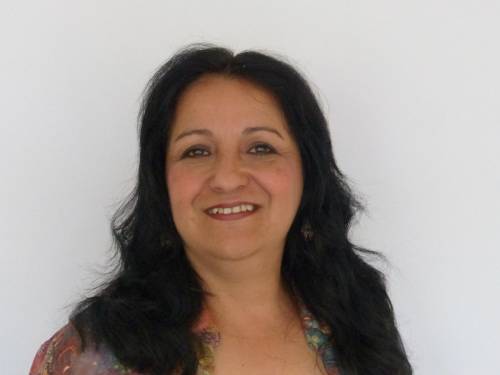Delia Leal from Guatemala focuses on female empowerment, income inequality
by Scott O’Neill | Presbyterian News Service

Delia Leal. (Photo provided)
LOUISVILLE – The Rev. Delia Leal is the regional coordinator for the Women’s Ministry program in Mexico and Central America with the Protestant Center for Pastoral Studies in Central America (CEDEPCA). Currently a pastor for a Baptist congregation, Leal will speak to U.S. congregations and organizations this fall as part of the 2017 International Peacemakers with the Presbyterian Peacemaking Program. This is her second visit as an International Peacemaker, having also participated in the program in 2009.
During her four-week visit in September and October, she will talk about the work that the Presbyterian Church supports and carries out in Guatemala and Central America through CEDEPCA, one of its two mission partners in Guatemala.
“Thanks to CEDEPCA and the PC(USA) in Guatemala, we work to transform the lives of people who are in despair, and help them recover hope and justice,” said Leal. “The support of the PC(USA) in Central America is a sign of life and life in abundance because it builds a more just world.”
Guatemala, bordered by Mexico to the north and west and Belize, Honduras, and the Caribbean Sea to the east, is the most populated country in Central America. The region’s rich history dates back to 1,200 B.C. and includes the classic Maya civilization.
But the country’s recent legacy includes a brutal 36-year internal armed conflict between guerilla factions and the government. With the largest economy in Central America, Guatemala is subject to internal corruption and exploitation by transnational companies harvesting the country’s raw materials for biofuels production and extraction of precious metals, according to Leal.
“We’re continually encouraging people to non-violently fight for the eco-system’s rights, but it’s exhausting and risky,” said Leal. “We’re in a constant search for spaces of dialogue in order to stop the mega-projects: hydroelectric plants, oil pipelines and the planting of African palm for cooking oil. These projects have little consideration for ramifications to local communities and allow the rich to get richer while the majority become even more impoverished. The challenge is to find creative ways to change this reality.”
Being a female clergy member in Guatemala brings its own set of challenges. Leal is often the only female pastor amongst her colleagues, and breaking down fundamentalist ideological structures and stereotypes is something she deals with daily. She persuades male religious leaders to allow women to rejoice in their faith without being oppressed or subordinated by pursuing gender equality and equity, and by combining feminist theology with pastoral action.
“Civic organizations are important,” said Leal. “By encouraging women to participate in local committees and become empowered, we help further the rights of women.”
Leal’s association with CEDEPCA, an educational non-profit organization promoting education, accompaniment, and safe reflection spaces to women and men of diverse Christian traditions and communities, changed her life and her approach to theology.
“Originally my background was in fundamentalist theological studies, however, when I started working with CEDEPCA 25 years ago, it changed my perspective to one of a liberating faith,” said Leal. “I also began to guide a congregation and my pastoral actions changed from service inward to service outward, to the community.”
“The challenges in Guatemala are to give hope during despair. The country is in a lamentable situation, the government has poorly enforced laws so it wears people down. Despite that, we need to build spaces of justice and peace for everyone. I hope that people feel encouraged and enthusiastic about the work and the support that PC(USA) provides, and bear witness to what it does in our region. PC(USA) teaches that Christian faith brings about changes for people in the here and now, not just in the afterlife in heaven.”
Leal is one of 15 peacemakers who will be visiting churches and institutions this fall. According to Carl Horton, coordinator for the Peacemaking Program, only a few openings remain in this year’s schedule. Click here to apply to host a 2017 International Peacemaker.
—–
The International Peacemaking Program is made possible by gifts to the Peace and Global Witness Offering.
![]() You may freely reuse and distribute this article in its entirety for non-commercial purposes in any medium. Please include author attribution, photography credits, and a link to the original article. This work is licensed under a Creative Commons Attribution-NonCommercial-NoDeratives 4.0 International License.
You may freely reuse and distribute this article in its entirety for non-commercial purposes in any medium. Please include author attribution, photography credits, and a link to the original article. This work is licensed under a Creative Commons Attribution-NonCommercial-NoDeratives 4.0 International License.